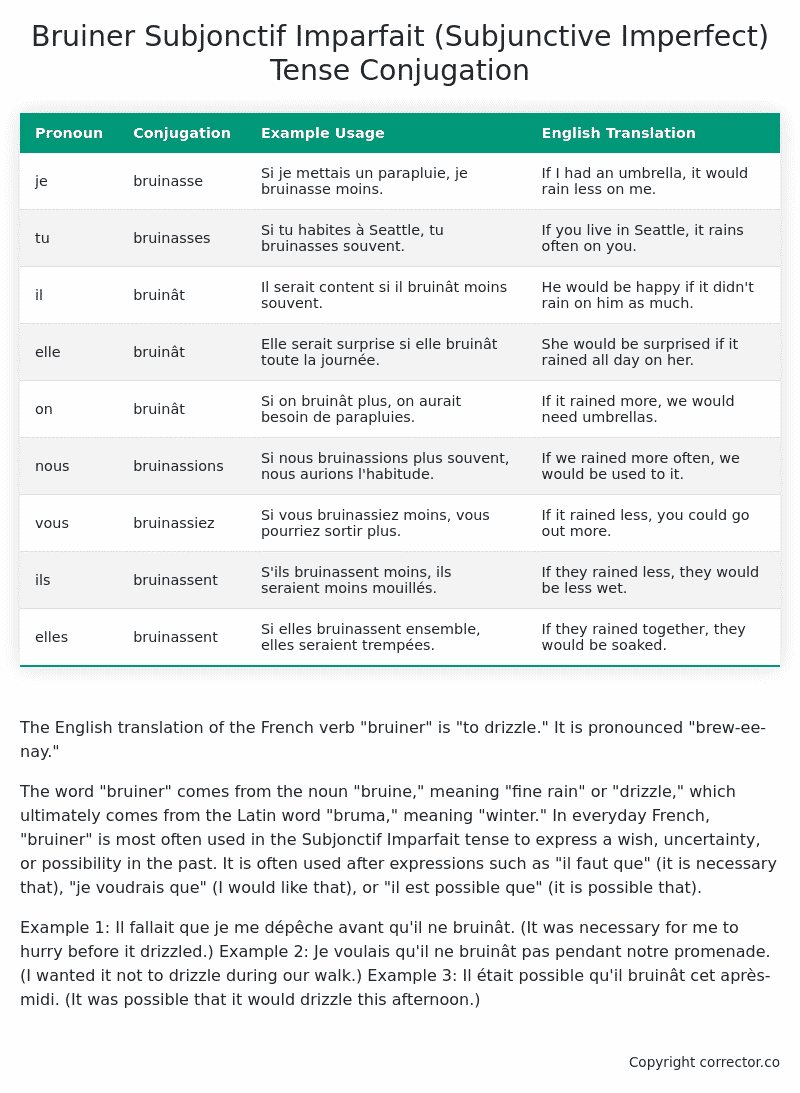Subjonctif Imparfait (Subjunctive Imperfect) Tense Conjugation of the French Verb bruiner
Introduction to the verb bruiner
The English translation of the French verb “bruiner” is “to drizzle.” It is pronounced “brew-ee-nay.”
The word “bruiner” comes from the noun “bruine,” meaning “fine rain” or “drizzle,” which ultimately comes from the Latin word “bruma,” meaning “winter.” In everyday French, “bruiner” is most often used in the Subjonctif Imparfait tense to express a wish, uncertainty, or possibility in the past. It is often used after expressions such as “il faut que” (it is necessary that), “je voudrais que” (I would like that), or “il est possible que” (it is possible that).
Example 1: Il fallait que je me dépêche avant qu’il ne bruinât. (It was necessary for me to hurry before it drizzled.)
Example 2: Je voulais qu’il ne bruinât pas pendant notre promenade. (I wanted it not to drizzle during our walk.)
Example 3: Il était possible qu’il bruinât cet après-midi. (It was possible that it would drizzle this afternoon.)
Table of the Subjonctif Imparfait (Subjunctive Imperfect) Tense Conjugation of bruiner
| Pronoun | Conjugation | Example Usage | English Translation |
|---|---|---|---|
| je | bruinasse | Si je mettais un parapluie, je bruinasse moins. | If I had an umbrella, it would rain less on me. |
| tu | bruinasses | Si tu habites à Seattle, tu bruinasses souvent. | If you live in Seattle, it rains often on you. |
| il | bruinât | Il serait content si il bruinât moins souvent. | He would be happy if it didn’t rain on him as much. |
| elle | bruinât | Elle serait surprise si elle bruinât toute la journée. | She would be surprised if it rained all day on her. |
| on | bruinât | Si on bruinât plus, on aurait besoin de parapluies. | If it rained more, we would need umbrellas. |
| nous | bruinassions | Si nous bruinassions plus souvent, nous aurions l’habitude. | If we rained more often, we would be used to it. |
| vous | bruinassiez | Si vous bruinassiez moins, vous pourriez sortir plus. | If it rained less, you could go out more. |
| ils | bruinassent | S’ils bruinassent moins, ils seraient moins mouillés. | If they rained less, they would be less wet. |
| elles | bruinassent | Si elles bruinassent ensemble, elles seraient trempées. | If they rained together, they would be soaked. |
Other Conjugations for Bruiner.
Le Present (Present Tense) Conjugation of the French Verb bruiner
Imparfait (Imperfect) Tense Conjugation of the French Verb bruiner
Passé Simple (Simple Past) Tense Conjugation of the French Verb bruiner
Passé Composé (Present Perfect) Tense Conjugation of the French Verb bruiner
Futur Simple (Simple Future) Tense Conjugation of the French Verb bruiner
Futur Proche (Near Future) Tense Conjugation of the French Verb bruiner
Plus-que-parfait (Pluperfect) Tense Conjugation of the French Verb bruiner
Passé Antérieur (Past Anterior) Tense Conjugation of the French Verb bruiner
Futur Antérieur (Future Anterior) Tense Conjugation of the French Verb bruiner
Subjonctif Présent (Subjunctive Present) Tense Conjugation of the French Verb bruiner
Subjonctif Passé (Subjunctive Past) Tense Conjugation of the French Verb bruiner
Subjonctif Imparfait (Subjunctive Imperfect) Tense Conjugation of the French Verb bruiner (this article)
Subjonctif Plus-que-parfait (Subjunctive Pluperfect) Tense Conjugation of the French Verb bruiner
Conditionnel Présent (Conditional Present) Tense Conjugation of the French Verb bruiner
Conditionnel Passé (Conditional Past) Tense Conjugation of the French Verb bruiner
L’impératif Présent (Imperative Present) Tense Conjugation of the French Verb bruiner
L’infinitif Présent (Infinitive Present) Tense Conjugation of the French Verb bruiner
Struggling with French verbs or the language in general? Why not use our free French Grammar Checker – no registration required!
Get a FREE Download Study Sheet of this Conjugation 🔥
Simply right click the image below, click “save image” and get your free reference for the bruiner Subjonctif Imparfait tense conjugation!

Bruiner – About the French Subjonctif Imparfait (Subjunctive Imperfect) Tense
Formation
Common Everyday Usage Patterns
Interactions with Other Tenses
Subjonctif Présent
Indicatif Passé Composé
Conditional
Conditional Perfect
Summary
I hope you enjoyed this article on the verb bruiner. Still in a learning mood? Check out another TOTALLY random French verb conjugation!


